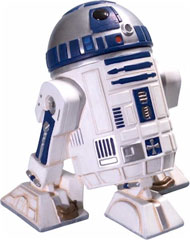70 years have passed since the Czech writer Karl Chapek coined the term "robot" (from the word "robota" - work), in a science fiction story he wrote about "artificial people". Since then, the robot has become an almost permanent element in science fiction works, starting with the "positronic" robots that obey the "three laws of robotics"

In reality, the robotics industry is much less glamorous: usually these are machines that perform complex operations in industrial plants. However, the technological reality has taken giant steps in the field of computers: the "deep blue" computer managed to beat the world champion in chess. But the enormous difficulties encountered by its developers only emphasized how sophisticated the human mind is; It is not easy to insert simple human intelligence in the vertex of a robot, even if the vertex contains a computer that performs millions of calculation operations per second.
For years, artificial intelligence scientists have been researching computing methods such as "fuzzy logic", "neural networks" and others that are supposed to imitate, even if in a crude and primitive way, the elusive, non-mathematical, sometimes vague human thinking - but this allows us to clean windows or park a car after a short training (Try teaching a robot to park a car in a busy city).
Will there be really smart robots with us in the next century? If we rely on the opinion of well-known experts in computing and robotics, the answer to this is probably positive. In a poll of experts in Japan using the "Delphi" method (an accepted method for long-term technological forecasts, in which a consensus is formed among a large group of experts), significant developments in the field of robotics were predicted, which will take place in the second decade of the next century, probably before the year 2015. Here are some examples:
"Smart" robots with a variety of sensors (hearing, vision, etc.) capable of sensing their surroundings and making independent decisions; Robots capable of locating, identifying and rescuing humans at disaster sites; Robots that perform housework (vacuuming, laundry, etc.) after learning the lifestyles of the residents of the house; Robots that care for people with severe disabilities.
These predictions sound quite conservative compared to the predictions of Professor Hans Moraback, a world-renowned scientist who has been involved in this field for 40 years and is currently the head of the Robotics Institute of Carnegie Mellon University in the USA. He also predicts that around the year 2010, mobile robots will appear, perhaps somewhat similar to a human in their external form, that will be able to perform various household chores. But in his opinion these will only be "generation" robots
Rishon", with the "mental capacity of a lizard", as he put it, which will be possible thanks to processors with an execution capacity of MIPS (5,000 MIPS = millions of instructions per second). For comparison, high-end personal computers today reach several hundred MIPS. The thinking capacity of the human brain, on the other hand, is probably equivalent to 100 million MIPS. That is, it is necessary to increase the performance of the processors by about a million times to approach the human thinking capacity.
And it will happen, sooner or later. Soon the "second generation" robots will appear with the brain power of a mouse, followed by the "third generation" with 5 million MIPS, roughly equivalent to a monkey's brain. By the year 2050, Professor Morabek is convinced, robots will roam the world that will not only be equal to humans in their intellectual capacity, but will even surpass them. The front of scientific research will pass to the hands and brains of the robots, of course. Sound scary? Maybe. Humanity will have to redefine its place and goals in this world and in other worlds. Morabek's "fourth generation" robots will be entitled to full equality of rights (will disconnecting them from an electric current be considered murder?). The question is whether we, flesh and blood human beings, will be entitled to equal rights in the eyes of the "fifth generation" robots.
